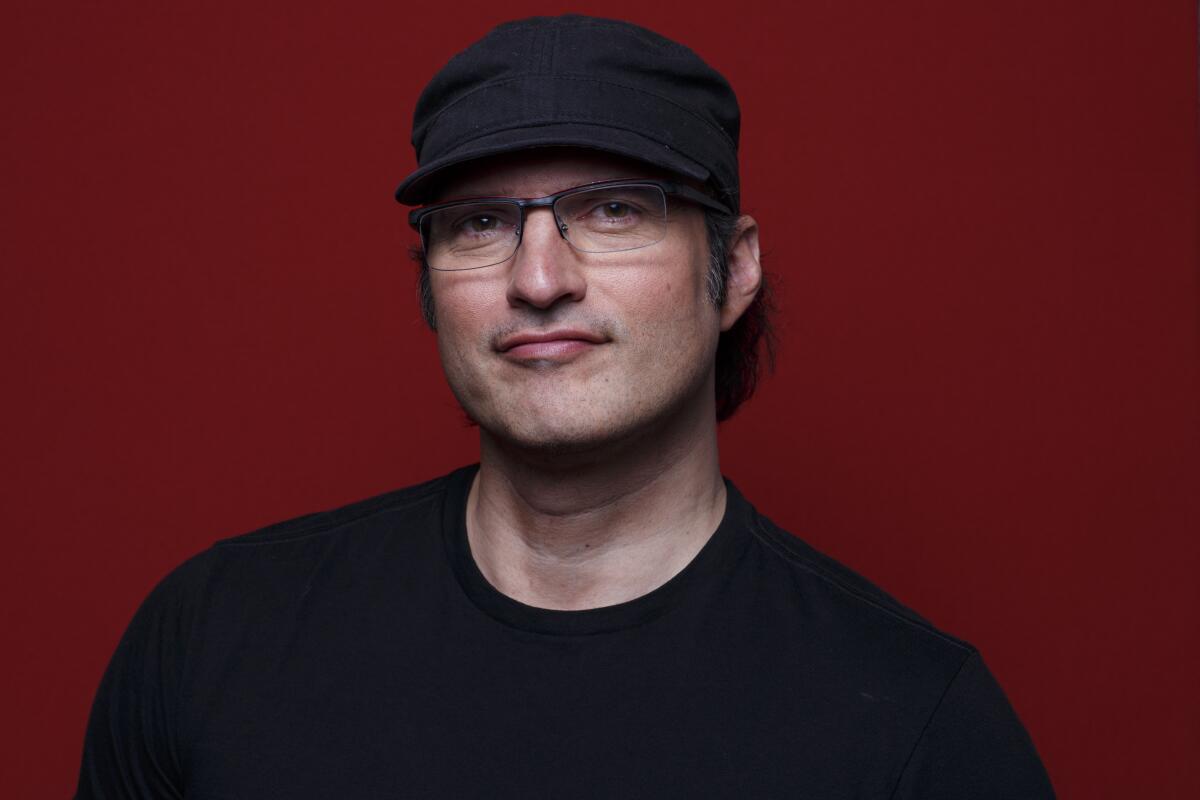Robert Rodriguez’s El Rey Network to revive through streaming after going dark

Filmmaker Robert Rodriguez launched his cable channel El Rey Network in 2013 to reach a growing population of young English-speaking Latinos.
Inside the business of entertainment
The Wide Shot brings you news, analysis and insights on everything from streaming wars to production — and what it all means for the future.
You may occasionally receive promotional content from the Los Angeles Times.
With programming such as “Lucha Underground” and backing from Spanish-language media giant Univision, Austin, Texas-based El Rey grew to become available in 40 million homes.
But it struggled to cultivate a big audience, and cord-cutting led pay-TV providers to prune their offerings by dumping smaller channels. With El Rey’s reach dwindling, Univision sold its minority stake and the network ceased operations in December.
Now, El Rey says it has found a way for its brand and content to live on by becoming a free streaming service.
The company is launching its free online version of El Rey Network through a deal with Los Angeles-based Cinedigm, which operates niche streaming networks including faith-based Dove Channel and cinephile-focused Fandor.
The deal gives Cinedigm exclusive rights to El Rey’s library of shows. El Rey — fully owned by Rodriguez and co-founders John Fogelman and Cristina Patwa — will use Cinedigm’s ad-sales, distribution and other business services to grow its streaming network.
Financial terms were not disclosed.
Rodriguez, who made his first film, “El Mariachi,” 30 years ago on a $7,000 budget, said making El Rey available at no cost to viewers online made sense for the brand’s audience.
“I made my first movie with no money, so that’s always been in my DNA,” Rodriguez said in an interview this week. “My audience is very much that scrappy audience. They want value for their dollar. I wanted to have a free network.”
In El Rey’s content, Cinedigm saw an opportunity to reach a long-neglected market. U.S. Latinos are expected to reach 20% of the population by 2025, according to census projections. Yet USC’s 2020 inclusion study of 1,300 popular films found that 4.9% of speaking roles in 2019 movies went to Hispanic or Latino actors.
“We are focused on super-serving underserved markets, and El Rey’s market of young Latinos is exactly that,” said Yolanda Macias, Cinedigm’s chief content officer.
El Rey hasn’t announced any new programs planned for the service. Its lineup will instead consist of its library of unscripted series such as “The Chuey Martinez Show” and “The Director’s Chair” featuring Rodriguez’s conversations with the likes of Quentin Tarantino, plus licensed grindhouse, action and horror films.
Under the deal, Cinedigm will distribute Rodriguez’s movie “Red 11,” which he made with his son Racer (again for $7,000) and premiered at SXSW in 2019. Cinedigm will also distribute the companion making-of docuseries “Rebel Without A Crew: The Robert Rodriguez Film School.”
“The documentary crew had more people in it than my film crew,” Rodriguez said.
Hollywood’s history with Latino representation is a muddy mess. Why even Washington politicians are taking action.
The film and series will come to the free El Rey channel at an undetermined date.
El Rey is the latest company to try to capture an audience for free, ad-supported streaming as subscription services such as Netflix and Disney+ get increasingly pricey for viewers.
Fox Corp.-owned Tubi and ViacomCBS’ Pluto TV, both free, are quickly growing their user counts. Roku Channel picked up shows orphaned by the defunct paid streamer Quibi, giving a second life to the Kevin Hart comedy “Die Hart.” Amazon is beefing up its free network IMDb TV.
Ad-supported and linear streaming platforms grew to account for 34% of the total share of U.S. streaming as of January, according to Nielsen, up from 28% a year earlier.
Fogelman, whose business incubator FactoryMade Ventures launched the channel, credited Rodriguez with pivoting the business as the industry changed.
“He made a bold move,” Fogelman said. “Robert just basically stood up and said: I don’t want to keep on adding more years to the old model.”
Rodriguez said the free streaming plan would be an ideal way to reach his target audience, which is young, tech savvy and price sensitive.
“Besides democratizing access for audiences, we also can do content that is more for our audience, especially for younger viewers,” Rodriguez said. “Many of them do not have access to cable and are yearning to see themselves reflected on the screen as part of developing and celebrating their true selves and their identities.”
More to Read
Inside the business of entertainment
The Wide Shot brings you news, analysis and insights on everything from streaming wars to production — and what it all means for the future.
You may occasionally receive promotional content from the Los Angeles Times.












